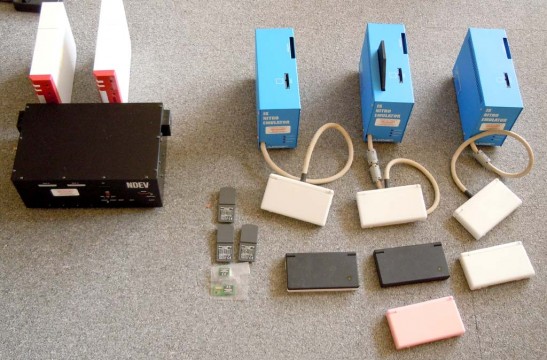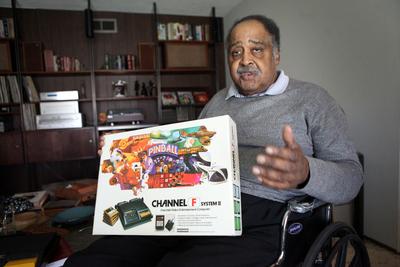Video game cartridge pioneer passes away
Jerry Lawson, the man who developed the first cartridge-based video game console system and one of the first African American engineers in Silicon Valley, passed away Saturday due to unknown causes.
Lawson was at the forefront of video game development in the 70s, inventing Fairchild Semiconductor’s Channel F, the first console with programmable game cartridges rather than built-in games. Just last month, Lawson was introduced as a gaming pioneer at the Game Developers Conference, and honored by the International Game Developers Association for arguably being one of the most important people to have worked in the video game industry.
After Fairchild, Lawson started his own company, Videosoft, which produced six games for the Atari 2600. Lawson then took on consulting jobs, which included clients such as Stevie Wonder, according to the Mercury News. Wonder wanted to produce the Wonder Clock, an alarm clock that used the voice of a child’s mother in lieu of traditional alarms. It was not produced, but the Mercury News reports on Lawson’s surprise when Wonder called him.
A memorial service is being planned by the folks at Digital Press, and the discussion can be found here.
Source: 1up.com; San Jose Mercury News
Capcom clarifies non-localization of Ace Attorney Investigations 2
As reported earlier here on Nintendojo, Capcom recently declared that there are no plans to localize Ace Attorney Investigations 2. When asked, VP of strategic planning and business development Christian Svensson simply said “The answer is ‘no.’ Sorry about that.” Later, however, Svensson altered the remark slightly, by saying “There are no plans for a Western release at this time for AAI2,” citing the fact that “plans change all the time.”
On Capcom-Unity, Capcom’s fan-based community, Svensson further clarified his remarks:
I’ll be a little more clear.
The costs of localization are higher than the forecasted return. And no, it wouldn’t sell more than Okamiden (which has already sold more than the first Investigations).
Could this content show up on some other platform somewhere down the line? Possibly, but there’s nothing on that front for me to talk about. I realize there are fans who would like to have this and I’ll be sure to explore ways that could happen viably in the future with our strategy and R&D teams but no promises.
If Capcom does not localize Ace Attorney Investigations 2, it will be the first time Capcom has refused to localize an Ace Attorney game since the original GBA versions of Phoenix Wright: Ace Attorney.
Source: Siliconera; Capcom Unity
DK Games shutters doors for Nintendo

Nintendo dev kits as photographed by Christophe Kohler of DK Games.
Cubed3 reports that Christophe Kohler, the head of indie game dev DK Games, has ceased development on Nintendo platforms “due to unfavourable financial arrangements with regard to payment from WiiWare.” DK Games cited low sales of WiiWare and DSiWare titles, including games such as Fishie Fishie:
I’ve been working on Nintendo platforms for 5 years now. My last Wiiware game (Fishie Fishie) dis not sold very well and did not reached the “threshold” value (check news on internet to know more about that rule for Wiiware developer). That means huge money loss for me. Wiiware (and Dsiware) was a great idea, but unfortunately not a big success.Today I gathered all my Nintendo development hardware and put them in boxes.I took a picture of everything. Maybe one day I’ll be back on Nintendo platform. I’d like to.
I got 1 Wii devkit, 2 Wii test unit, 1 retail wii (not on picture), 3 DS devkits, 1 DSi test unit, 2 retail DS, 1 retail DSi, and some cards for DS game testing.
Everything is useless now. Wow that’s a nice collection.
Cubed3 has some very interesting statistics garnered from Kotaku and GDC based on how many units a developer must sell in order to get their cut of the game’s proceeds from Nintendo, as well as other constraints imposed by Nintendo. These are the same constraints that have historically driven developers such as Team Meat away from Nintendo.
Source: Cubed3; RaggedEdge Online
Grammy Awards to recognize video games
Christopher Tin, the composer best-known for his song “Baba Yetu”, which played on the title screen of Civilization IV, won a Grammy last year after re-releasing “Baba Yetu” on a non-video game-related album. That propelled Tin to be the first composer to have won a Grammy for a video game piece, and in turn made “Baba Yetu” the first video game piece to have won a Grammy. Turns out this kind of success will be even more prevalent, hopefully, in the future, because 1up.com reports that the Grammy Music Awards have officially recognized video games alongside television and film. 1up quotes several people, among them Christopher Lennertz, video game composer:
“The composers and artists working in this field are consistently delivering at the highest level in entertainment,” said composer Christopher Lennertz, who has worked on films like Hop, as well as a number of videogames. “Because of the nature of video games, the musical score has an even greater responsibility to the drama: many times adding the subtext and emotional backstory that would be delivered by dialogue in a traditional film script. More than ever, a game score needs to not only set the mood and pace of an adventure, but also add stakes and drama to an ever evolving interactive storyline.”
According to 1up.com, video games will now be included in the four following categories: The Music for Visual Media, Best Compilation Soundtrack for Visual Media, Best Compilation Soundtrack for Visual Media, Best Score Soundtrack for Visual Media, and Best Song Written for Visual Media. Previously, video games were relegated to “other visual media.”
Source: 1up.com




 ShareThis
ShareThis







